Industry witnesses significant rise in recent years
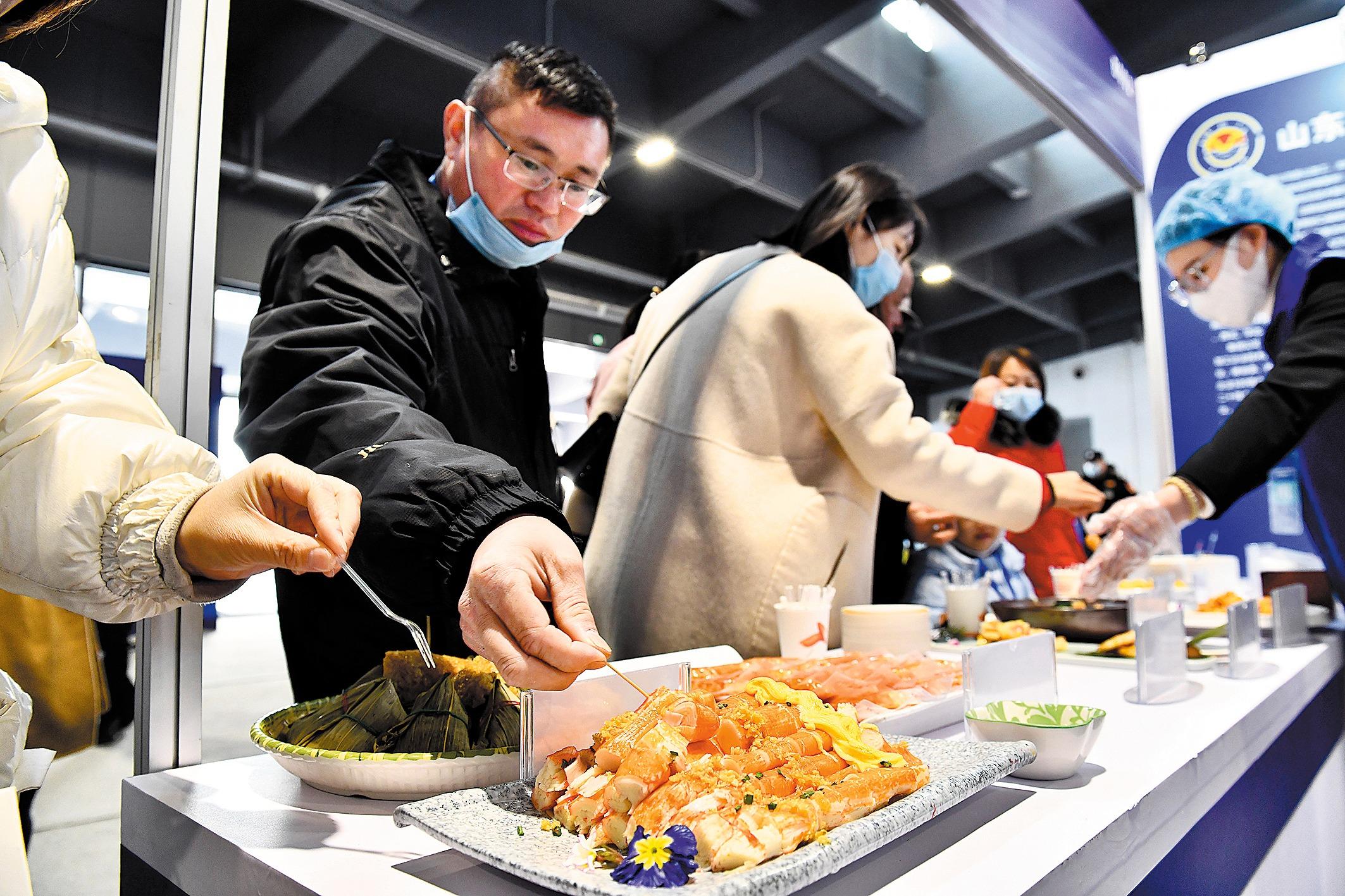 Visitors sample dishes at a pre-made food expo in Rizhao, Shandong province, in February. (PHOTO / XINHUA)
Visitors sample dishes at a pre-made food expo in Rizhao, Shandong province, in February. (PHOTO / XINHUA)
When a bamboo shoot is dug from the earth in Lin'an city, Zhejiang province, the countdown begins.
Within 72 hours, the fresh spring ingredient is made into yan du xian, a soup with fresh and pickled streaky pork, and placed on shelves at Freshippo supermarkets, a fresh food chain owned by Alibaba.
Feng Juan, who makes purchases for Freshippo, started preparing for the arrival of the bamboo shoots just after Spring Festival. "We ordered them a month in advance and finalized the recipe," she said.
"Yan du xian is a classic southern dish that has gained popularity in northern areas of China in the past two years. It's not that difficult to make it into a pre-cooked product, but the hard part is using fresh seasonal bamboo shoots."
Feng keeps an eye on when the shoots are ready to be harvested. "As soon as they are harvested, work starts immediately on the shoots in factories," she said, adding that six factories in different locations await their arrival.
To retain their freshness and sweetness, the shoots are peeled and cut by farmers within 24 hours of being harvested, before being sent to the factories by cold-chain transportation.
In recent years, the pre-made food industry in China has experienced a significant rise, characterized by a shift toward healthier and more convenient options through the development of innovative products. Furthermore, the industry has embraced new technologies in processing methods and supply chain innovation.
On Feb 13, the Communist Party of China Central Committee and the State Council issued the No 1 Central Document, which referred for the first time to the importance of cultivating and developing the pre-made food industry.
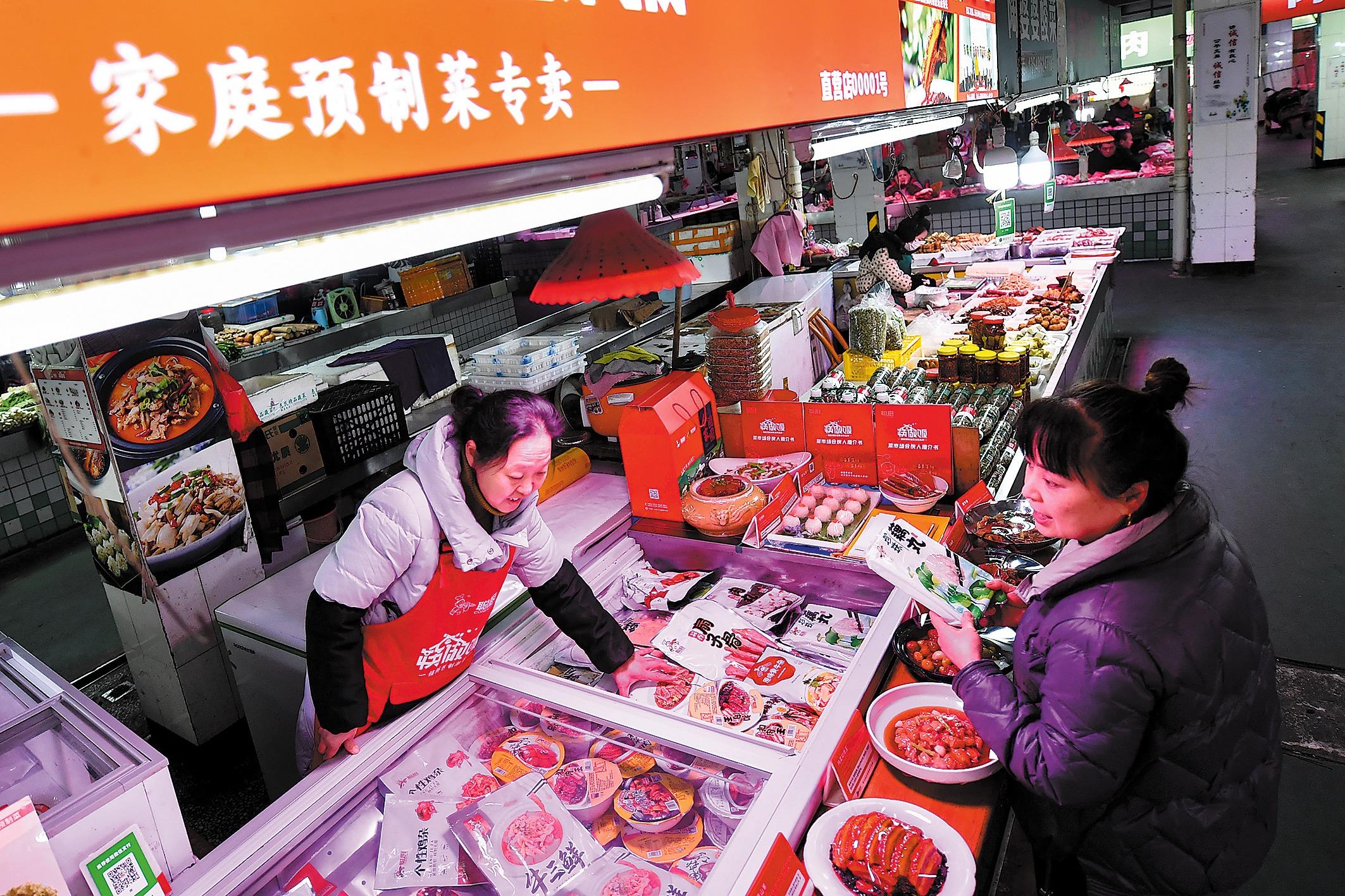 Pre-made dishes are offered at a market in Liuyang, Hunan province. (PHOTO / XINHUA)
Pre-made dishes are offered at a market in Liuyang, Hunan province. (PHOTO / XINHUA)
During this year's two sessions annual political gatherings, Zheng Simin, a deputy to the National People's Congress and chairwoman of Shandong Delisi Food, submitted suggestions about developing the industry.
She feels that although the industry has been developing well, it has weaknesses, such as a lack of industrial and national standardization, which could hamper its long-term development.
Zheng suggested launching a development fund to support the industry in fields such as technology research, talent training, and standardization of Chinese cuisine.
Data from the China Pre-made Food Alliance show the number of pre-cooked food companies in the nation has risen from 2,000 a decade ago to more than 70,000.
Rupert Hoogewerf, chairman and chief researcher of Hurun Report, a research, media and investments business best known for its Hurun Rich List, which ranks the wealthiest individuals in China, said the nation's pre-cooked food industry has developed rapidly in recent years.
In 2021, the market scale of this industry reached about 350 billion yuan ($50.8 billion), a year-on-year rise of 20 percent, and it is expected to exceed 1 trillion yuan within the next five years, he said.
During the International Precooked Food Industry Conference in Foshan, Guangdong province, early last month, the Hurun China Precooked Food Companies 2023 catalog was released by the Hurun Research Institute and the conference organizers.
It was the first time Hurun had released a top-100 list of pre-cooked food companies.
Such food can be categorized into four main types based on the level of processing difficulty: ready-to-assemble; ready-to-cook; ready-to-heat; and ready-to-eat. Of the companies featured on the list, 44 percent specialize in ready-to-cook products, while 25 percent offer ready-to-assemble options.
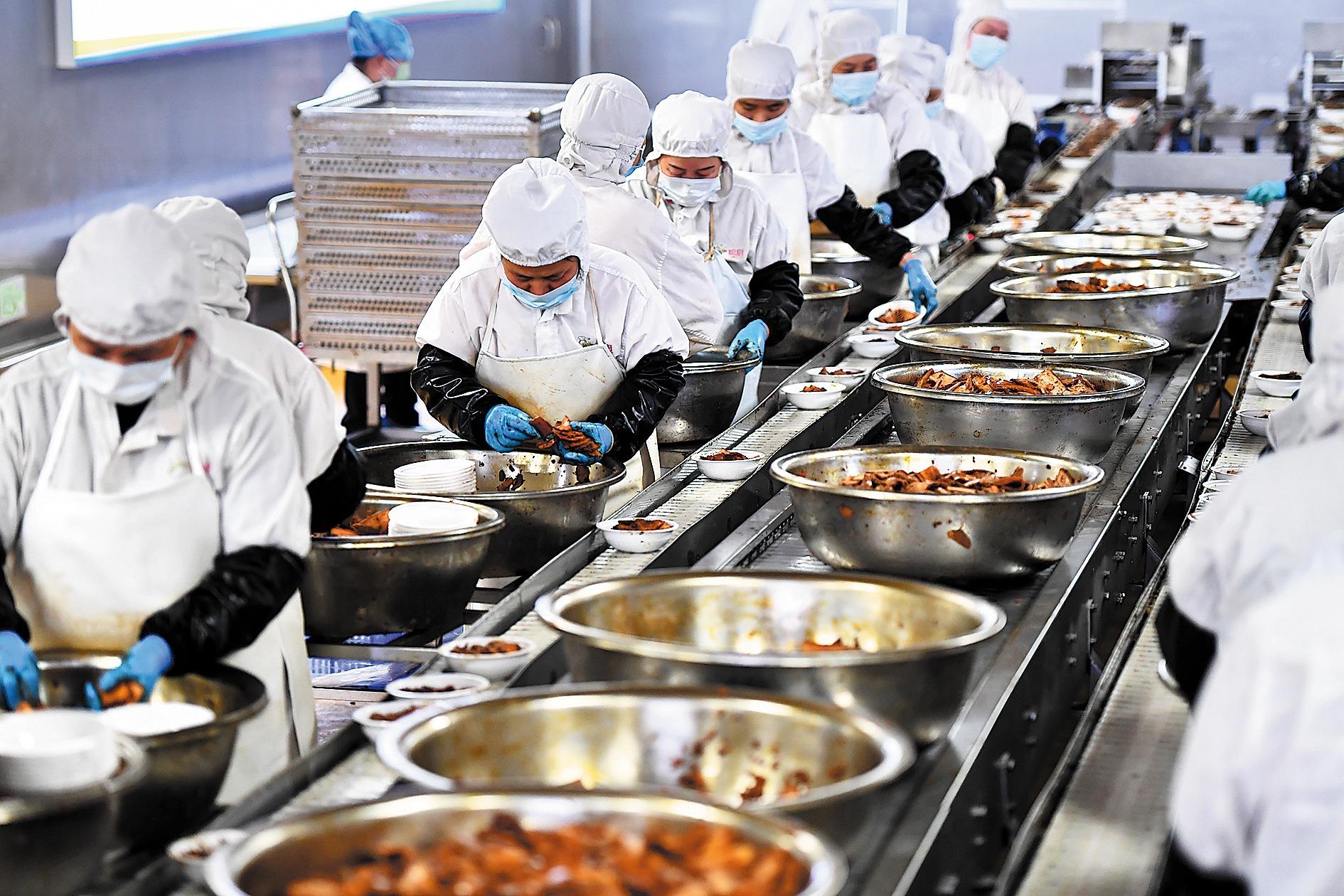 Workers produce pre-made dishes at a factory in Liuyang, Hunan province. (PHOTO / XINHUA)
Workers produce pre-made dishes at a factory in Liuyang, Hunan province. (PHOTO / XINHUA)
The list shows that Guangdong is home to the largest number of these companies, with 20 based in the province. Shanghai and Beijing are second and third, with 14 and 12 companies, respectively.
More than half the companies on the list, including Anjoy Foods and Qianwei Yangchu Food, focus primarily on food processing. In addition, one-fifth of them are caterers, such as Yum China, Meizhou Dongpo, and Juewei Food.
Hoogewerf said he hopes the list can help more people take notice of and understand the pre-cooked food industry and also attract more powerful enterprises to this field.
"The industry has entered a golden age of rapid development and innovation. I believe the list will be quite different in five years, as it will include many emerging companies. We hope to encourage more new and innovative enterprises to enter this industry," he said.
Hoogewerf thinks related policies in different regions, such as the issuance of 10 measures to accelerate high-quality development of the industry in Guangdong, have played a role in stimulating development of the pre-cooked food market.
Last year, regional pre-made food industry alliances emerged in areas such as Hunan, Shandong and Shanxi provinces, and also in Shanghai. In addition, regional regulations and guidelines covering the industry have been issued.
In recent years, pre-cooked food has become a touchstone for catering enterprises and companies in other fields to explore new avenues in the retail industry.
Last month, sportswear brand Guirenniao founded a pre-made food company, while Foshan Haitian Flavoring & Food, which focuses on soybean sauce, recently launched two pre-made fish products.
With competition in this field intensifying, online grocery platforms Freshippo and Dingdong Maicai, which rank 30th and 50th, respectively, on the top-100 list, are expanding their product range with innovation and healthier choices.
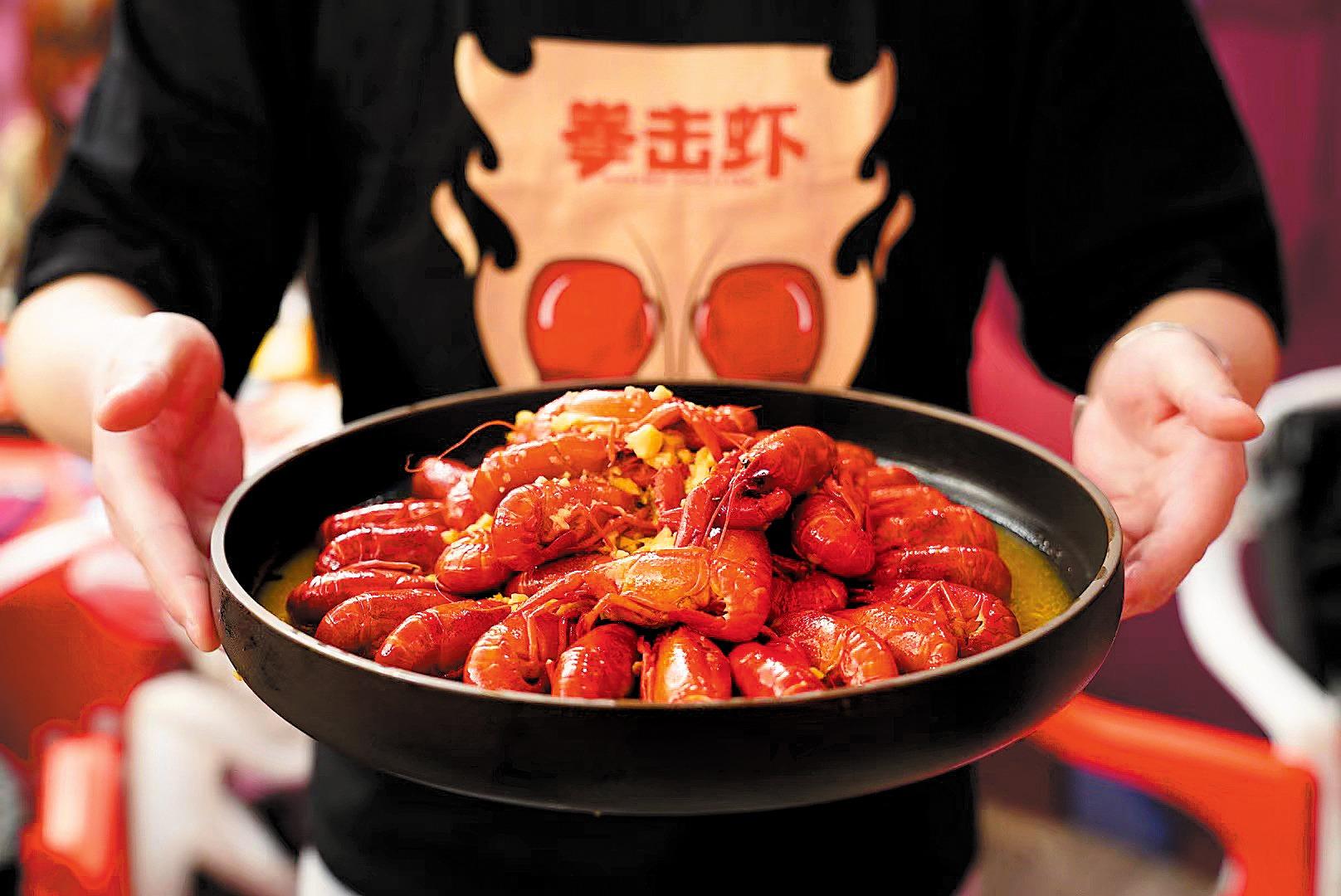 Spicy crawfish is a popular pre-made dish offered by Dingdong Maicai. (PHOTO PROVIDED TO CHINA DAILY)
Spicy crawfish is a popular pre-made dish offered by Dingdong Maicai. (PHOTO PROVIDED TO CHINA DAILY)
Niche market
In addition to spring bamboo shoots, balloonfish, which is usually found only in high-end restaurants, is being delivered to customers nationwide by Freshippo.
This fish, which is well known in areas alongside the Yangtze River, is now transported to other parts of China, and has become relatively popular in the north and southwest of the country.
To make cooking the fish easier, a seasoning bag made from balloonfish soup is added to each pre-cooked product.
Chen Huifang, who is responsible for Freshippo's pre-cooked food business, said that from mid-February to this month, the platform launched about 40 pre-cooked products for spring, and each dish, such as yan du xian, is fast-produced.
In the past five years, Freshippo has established 300 supply chains for fresh food products, Chen said. In August, supply chain centers started operating in Chengdu, capital of Sichuan province, and Wuhan, the Hubei provincial capital, as well as a special kitchen for the platform's ready-to-cook, ready-to-heat and ready-to-eat offerings, known as 3R products.
A regional research and development center was also set up in the main kitchen in Chengdu to create new pre-cooked products with regional features. This kitchen has shortened the launch time for a new product to three days, compared with two weeks previously.
Tian Xin, general manager of Freshippo's 3R product center, said that in 2019, the platform brought roasted fish, a dish only found in restaurants, to its cold storage shelves. The dish has been a success since it launched.
"Roasted fish is not easy for customers to cook at home, so we thought that if we could turn it into a pre-cooked product that largely retained the flavor found in a restaurant, it may gain market recognition," Tian said.
He added that pre-cooked roasted fish, which is now available in five flavors, brings Freshippo an annual income of more than 25 million yuan.
Tian thinks that in addition to the appealing flavor of dishes, convenience is a key factor. "If a pre-cooked dish cannot be heated by a microwave or air fryer, it won't attract customers," he said.
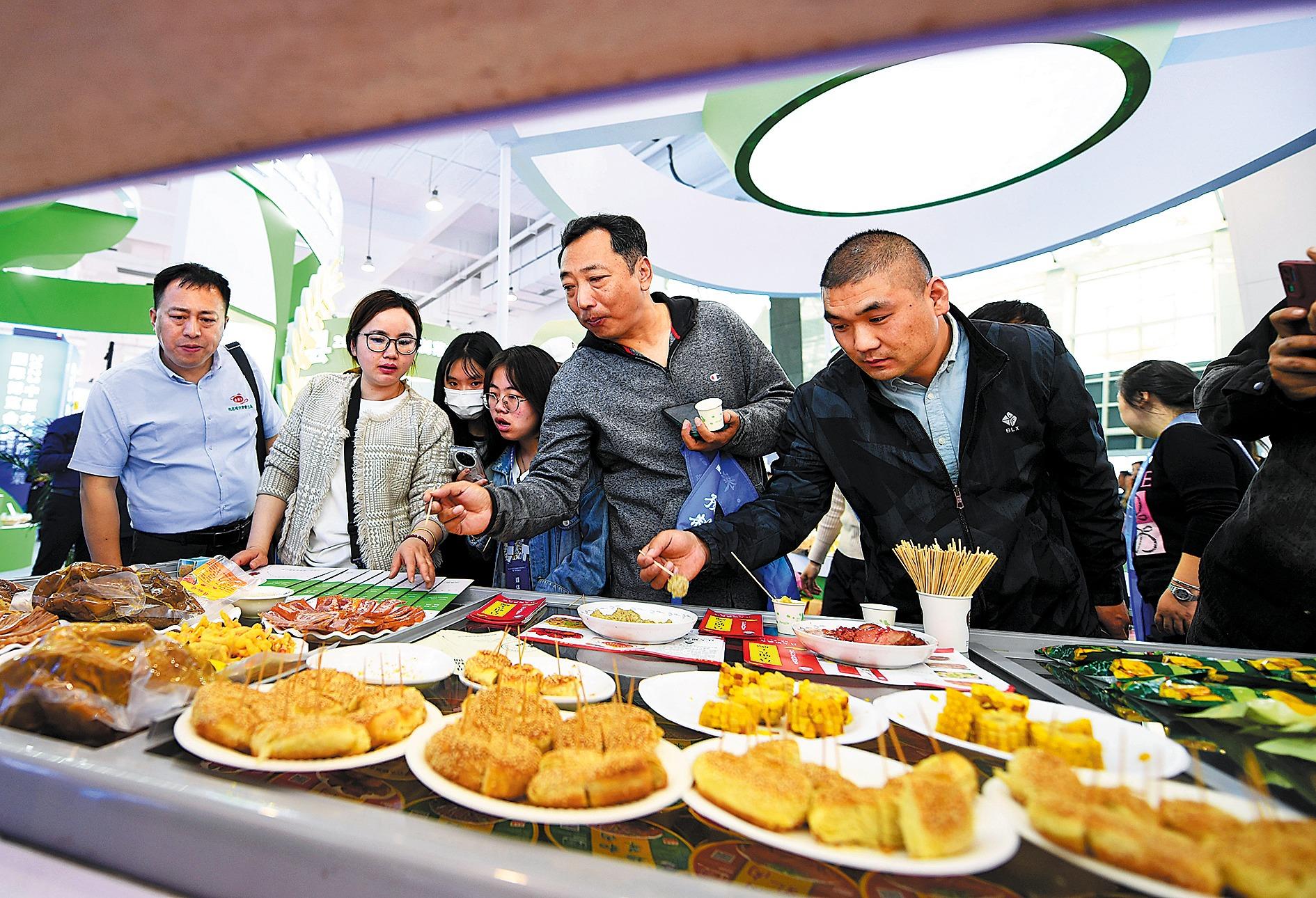 An international pre-made food expo is held in Xinxiang, Henan province, this month. (PHOTO / XINHUA)
An international pre-made food expo is held in Xinxiang, Henan province, this month. (PHOTO / XINHUA)
Full industrial chain
To meet growing demand for quick and convenient meals during the COVID-19 pandemic, Dingdong Maicai established a pre-made food department in June 2020, which now operates more than 40 factories. Last year, its pepper pork belly and chicken soup products generated sales of 80 million yuan.
Ou Houxi, who is responsible for the platform's pre-made food, said there has been growing demand.
In February, Dingdong Maicai said it was making an offer worth 5 billion yuan to recruit partners across all links of the industrial chain to improve its pre-made food products.
As more than 20 percent of its customers are 30 or younger, the platform is developing more Chinese cuisine pre-made products to meet demand for food with a low oil and salt content. "This year, we are taking a healthier path," Ou said.
Zhu He, food scientist at Dingdong Maicai, has developed a drunken chicken pot product, for which each ingredient and seasoning, including salt, is measured precisely to the gram.
An executive chef at a five-star hotel before switching to food research and development, one problem for Zhu in his new career is how to turn a chef's version of a dish into a pre-cooked product.
"If I boil 2 kilograms of water for two hours in a kitchen, half of it will evaporate, while in the factory only about 20 to 30 kilograms of water per hour will vaporize in a 400-kilogram pot," Zhu said.
"As a chef, I use a whole chicken to make one portion of soup, which is fine. But I needed to think about ways to produce a full portion in each pre-cooked soup product. Finally, we separated the chicken wings and legs, before steaming them. When we package the soup, each part is added in succession.
"In industrial production, each dish is separated in different steps, with each worker only responsible for a single step before all the parts are packaged."
Zhu said the faster a product is frozen, the better it retains its original flavor.
"Working in a hotel, you might only serve certain people, while for pre-made dishes, you cater to all customers. Each day, we are creating new things, and I enjoy experimenting with new dishes," he added.


